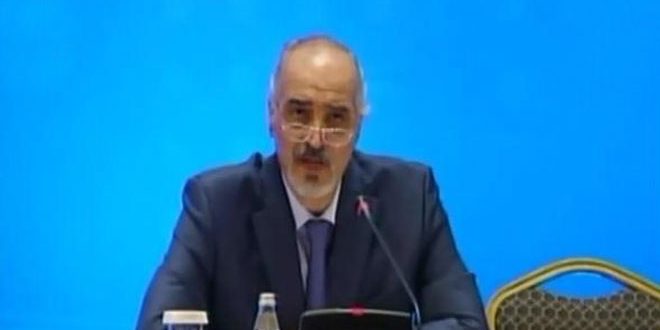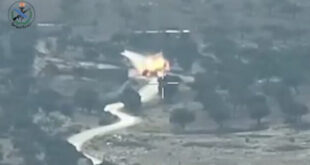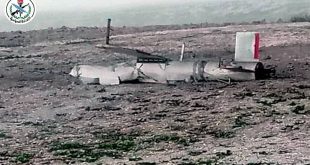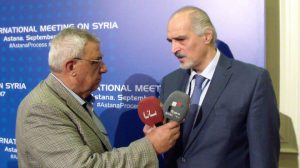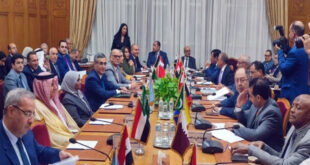Astana, SANA – Head of the Syrian Arab Republic delegation to the 6th round of Astana meeting, Bashar al-Jaafari said that Idleb has been included to the four de-escalation zones in Syria.
In a press conference after wrapping up Astana-6 meeting, al-Jaafari stated that the 6th round of talks was successful, adding that the participating parties agreed on several documents, the most important of which is the establishment of a de-escalation zone in Idleb province.
He noted that after consultations with the Syrian government by the Russian and Iranian sides, the guarantors agreed on special arrangements for creating the de-escalation zone in Idleb province.
Al-Jaafari stressed Syria’s support to any initiative that stops shedding the Syrian blood and alleviates the suffering of its people everywhere.
The Syrian diplomat highlighted the great achievements made by the Syrian army in lifting the 3-year ISIS siege of Deir Ezzor, in cooperation with its allies, backup forces and friendly states.
He noted that the siege-breaking of Deir Ezzor has great significance in regard to the humanitarian and military situation, therefore, food and medicine convoys are entering the city with the aim of reducing the suffering of its inhabitants due to the terrorist siege imposed on the city over the last three years.
Al-Jaafari stressed that the army’s victories over ISIS terrorist organization throughout different Syrian areas reaffirm the Syrian Arab Republic’s determination to liberate all the Syrian territory from terrorism.
Regarding guarantees to implement the de-escalation zone agreement, al-Jaafari said that as long as Russia, Iran and Turkey are called guarantor states, they are concerned with preserving Syria’s territorial integrity, sovereignty and independence.
He added that the final statement of Astana-6 meeting tests the credibility of all parties which bet on using terrorism in Syria as a political weapon to put pressure on the Syrian government, noting that determining who wins and who loses depends on the practical implementation on the ground.
On appropriate measures to ensure the safety of civilians in Idleb, al-Jaafari noted that the Syrian army will decide the best mechanisms to carry out the agreement since it knows the geographical maps of the country.
He referred to the calls of Russia, Iran and Syria’s friends around the world upon the US to help separate terrorists from the opposition without any response.
Regarding Turkey’s seriousness in commitment to the de-escalation zone agreement, al-Jaafari said that the other two guarantor states have to monitor the commitment of the Turkish side, adding that the Syrian government will follow up on the implementation of the final statement on the ground to determine its attitude towards this issue.
He noted that this agreement is a temporary measure which lasts for 6 months and it will be automatically extended upon the agreement of all parties concerned but if one party finds a problem, it could be raised to draw attention that there is a party which does not comply with the agreement.
Al-Jaafari reiterated that the military existence of any foreign force, whether from the U.S., Turkey, Britain, France or other states, on the Syrian territory without the approval of the Syrian government is “illegitimate”.
He stressed that the Turkish government or any other state that illegally sends troops to Syria or helps terrorists there should commit to preserving Syria’s sovereignty, independence and territorial integrity.
Al-Jaafari: Astana Final statement is positive and outcome of joint international efforts
Dr. al-Jaafari stressed that the final statement was “positive and the outcome of joint international efforts.”
In a statement to SANA delegate to Astana meeting, Al-Jaafari stated the final statement is the outcome of three days of joint international efforts and consultations between the Syrian delegation and Syria’s friends and allies as well as the Kazakh government which has coordinated holding this meeting.
The diplomat said that the experts felt the influential impact of the Syrian delegation’s talks with all participating parties on the final statement, adding that all provisions of the statement are important but the most important of which is that providing for the commitment of all parties including Turkey, Jordan, the Israeli entity and the US, without mentioning their names, in addition to the three guarantor states to Syria’s sovereignty, political independence and territorial integrity.
Al-Jaafari said that according to the final statement, Turkey and the armed opposition groups attending the meeting are now obliged to fight terrorism side by side with the Syrian army, its allies and the friendly states.
He pointed out that the implementation of this agreement on the ground will be significant in terms of combating terrorism, noting that there is a consultation mechanism with the Syrian government and other mechanisms for questionability and accountability.
Al-Jaafari concluded that it is a temporary agreement that lasts for six months during which it will be evaluated.
Lavrentiev: The documents adopted in Astana-6 are solid basis for strengthening cessation of hostilities regime in Syria
The head of the Russian delegation to the Astana-6 meetings on Syria Alexander Lavrentiev expressed optimism that the documents adopted at meeting would become a solid basis for strengthening the cessation of hostilities regime as a basic condition for advancing the dialogue between the Syrian government and the opposition.
In a press conference following the conclusion of the sixth round of the Astana meeting, Lavrentiev hoped that the participants in Astana talks will benefit from the positive achieved results in launching the political process in Syria, adding that main points of which are to preserve the unity and the sovereignty of Syria.
He stressed that the 6th Astana meeting affirms the effectiveness of the Astana Platform and the necessity of concerted efforts to stabilize the situation in Syria, calling on all countries to support the stability of the situation and bring peace to Syria.
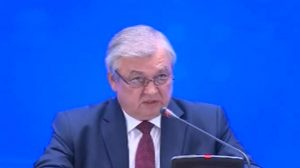
He pointed out that the results of the Astana meeting confirmed the validity of the strategic choice taken by the guarantor states with regard to moving forward towards the establishment of de-escalation zones and increasing the fight against terrorist threats such as ISIS and Jabhat al-Nusra and the forces allied with them.
“It is extremely important, as we believe, to get the armed opposition, or its constructive part, to join as soon as possible the fight against the terrorist groups operating in Syria, namely ISIS and Jabhat al-Nusra,” Lavrentyev added.
“The Syrians’ unity against terrorism will lay the groundwork for enhancing trust between them, rather than will just merely allow to reach positive changes ‘on the ground,’ at the battlefield, in the Syrian Republic,” he said.
He revealed that the guarantor states held constructive talks with the opposition and asked them not to put demands that cannot be implemented and to launch the process of freeing hostages and detainees and handing over bodies.
The Russian diplomat said that the attempts of some “opposition” groups to unite under the banner of one army is unlikely to benefit the improvement of combating ISIS and Jabhat al-Nusra terrorist organizations, indicating that the guarantor states called on the “opposition” to reconsider their positions towards a position that is more constructive.
Lavrentiev pointed out that the upcoming Astana meeting will focus on the effectiveness of the de-escalation areas or the need to make some adjustments in its monitoring way and the establishment of a working group on the release of detainees and possibly other initiatives that contribute to the peace process in addition to the issue of demining, including sites of cultural heritage.
We will try our best to support the Geneva process and all other initiatives issued by the United Nations, he added.
For his part, head of Iranian felegation to the 6th Astana meeting Hossein Jaberi Ansari affirmed that the 6th round of Astana meetings was successful by all standards.
Speaking to al-Alam TV channel, Ansari said that four documents were agreed among within the framework of the 6th Astana meeting, all of which are linked to procedural details in the areas of de-escalation, including the fourth area in Idleb.
He pointed out that no official invitations have been sent to any country on monitoring the cessation of hostilities in Syria, and this is linked to consensus among the guarantor states.
R.Raslan/Manar/Ghossoun
 Syrian Arab News Agency S A N A
Syrian Arab News Agency S A N A
